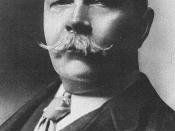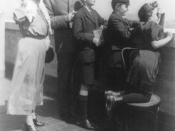Sir Arthur Conan Doyle, creator of the fictional detective known as Sherlock Holmes, once said, "What can we know? What are we all? Poor silly half-brained things peering out at the infinite, with the aspirations of angels and the instincts of beasts." Although human beings eventually possess both qualities of good and evil, instinct is something that people are born with. As children grow, they learn the difference between right and wrong. Most importantly, though, they learn that instinct is not rewarded. Instinct, in a child, is an impulse... it is kicking and screaming and misbehaving. It is not tolerated. Instinct is not good; it is evil. But, what causes a child to act on his or her evil tendencies? The answer lies in the book of Psalm, the intellect of Freud, and the under-developed brains of children.
In the Holy Bible, the story begins in the Garden of Eden.
Inside this garden, God's new creations are tempted into sin. Adam and Eve encounter Satan who is disguised as a serpent. Thus, Eve eats the forbidden fruit and introduces sin into human nature forever. The story lays a very sturdy foundation for the insistent study of good and evil--this basis is the belief of original sin. Because of Eve's decision to eat the forbidden fruit, all people who are born after her are born with the seed of evil already planted inside them. Original sin is personal, but it is not the sin that comes from free will; it is not the retribution or outcome of one's personal choices. It is personal because every human being is born with the temptation and invitation to sin. Surely a man is sinful at birth, sinful from the moment his mother conceived him (Psalm 51:5).
Freud, the mastermind of the mind,


